NSB305 - Building Professional Capacity: GRN Scope of Practice
VerifiedAdded on 2022/09/28
|9
|2246
|27
Essay
AI Summary
This essay delves into the professional practice issues encountered by graduate registered nurses (GRNs), specifically focusing on the challenges related to working outside their defined scope of practice. The analysis explores the impact of these issues on patient-centered care, encompassing both short-term effects like work fatigue and medication errors, and long-term consequences such as reduced patient health outcomes and potential ethical/legal complications. The essay emphasizes the importance of adhering to the scope of practice to ensure safe and effective patient care, while also acknowledging the difficulties faced by GRNs during their transition to practice. The discussion highlights the need for education and support to enable GRNs to navigate complex clinical situations and uphold ethical standards. Furthermore, the essay examines the implications of these issues on the nurses themselves, including the potential for increased stress and burnout, as well as the long-term implications on their career. The essay concludes by emphasizing the need for strategies to support GRNs in navigating these challenges and ensuring safe, patient-centered care.
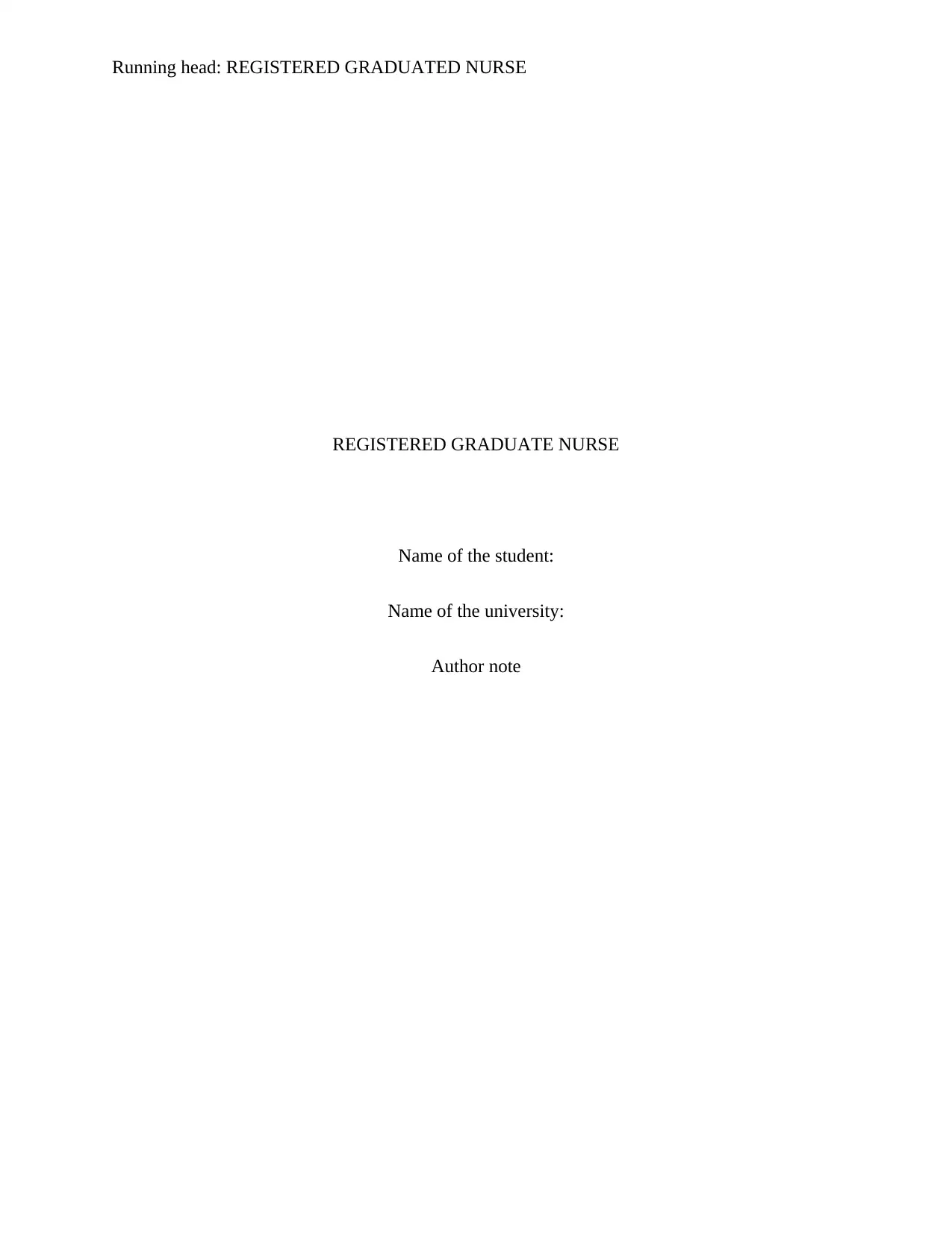
Running head: REGISTERED GRADUATED NURSE
REGISTERED GRADUATE NURSE
Name of the student:
Name of the university:
Author note
REGISTERED GRADUATE NURSE
Name of the student:
Name of the university:
Author note
Paraphrase This Document
Need a fresh take? Get an instant paraphrase of this document with our AI Paraphraser
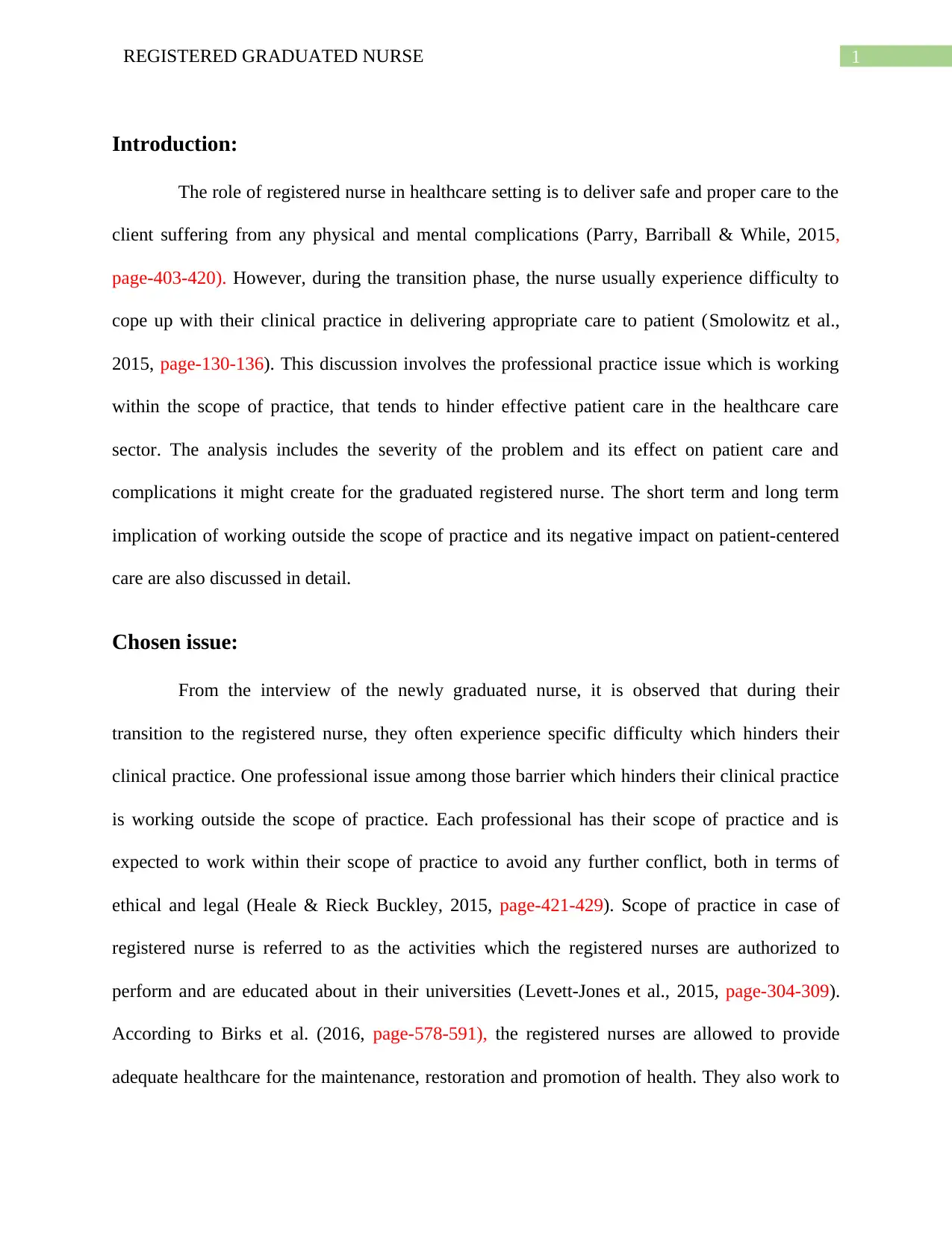
1REGISTERED GRADUATED NURSE
Introduction:
The role of registered nurse in healthcare setting is to deliver safe and proper care to the
client suffering from any physical and mental complications (Parry, Barriball & While, 2015,
page-403-420). However, during the transition phase, the nurse usually experience difficulty to
cope up with their clinical practice in delivering appropriate care to patient (Smolowitz et al.,
2015, page-130-136). This discussion involves the professional practice issue which is working
within the scope of practice, that tends to hinder effective patient care in the healthcare care
sector. The analysis includes the severity of the problem and its effect on patient care and
complications it might create for the graduated registered nurse. The short term and long term
implication of working outside the scope of practice and its negative impact on patient-centered
care are also discussed in detail.
Chosen issue:
From the interview of the newly graduated nurse, it is observed that during their
transition to the registered nurse, they often experience specific difficulty which hinders their
clinical practice. One professional issue among those barrier which hinders their clinical practice
is working outside the scope of practice. Each professional has their scope of practice and is
expected to work within their scope of practice to avoid any further conflict, both in terms of
ethical and legal (Heale & Rieck Buckley, 2015, page-421-429). Scope of practice in case of
registered nurse is referred to as the activities which the registered nurses are authorized to
perform and are educated about in their universities (Levett-Jones et al., 2015, page-304-309).
According to Birks et al. (2016, page-578-591), the registered nurses are allowed to provide
adequate healthcare for the maintenance, restoration and promotion of health. They also work to
Introduction:
The role of registered nurse in healthcare setting is to deliver safe and proper care to the
client suffering from any physical and mental complications (Parry, Barriball & While, 2015,
page-403-420). However, during the transition phase, the nurse usually experience difficulty to
cope up with their clinical practice in delivering appropriate care to patient (Smolowitz et al.,
2015, page-130-136). This discussion involves the professional practice issue which is working
within the scope of practice, that tends to hinder effective patient care in the healthcare care
sector. The analysis includes the severity of the problem and its effect on patient care and
complications it might create for the graduated registered nurse. The short term and long term
implication of working outside the scope of practice and its negative impact on patient-centered
care are also discussed in detail.
Chosen issue:
From the interview of the newly graduated nurse, it is observed that during their
transition to the registered nurse, they often experience specific difficulty which hinders their
clinical practice. One professional issue among those barrier which hinders their clinical practice
is working outside the scope of practice. Each professional has their scope of practice and is
expected to work within their scope of practice to avoid any further conflict, both in terms of
ethical and legal (Heale & Rieck Buckley, 2015, page-421-429). Scope of practice in case of
registered nurse is referred to as the activities which the registered nurses are authorized to
perform and are educated about in their universities (Levett-Jones et al., 2015, page-304-309).
According to Birks et al. (2016, page-578-591), the registered nurses are allowed to provide
adequate healthcare for the maintenance, restoration and promotion of health. They also work to
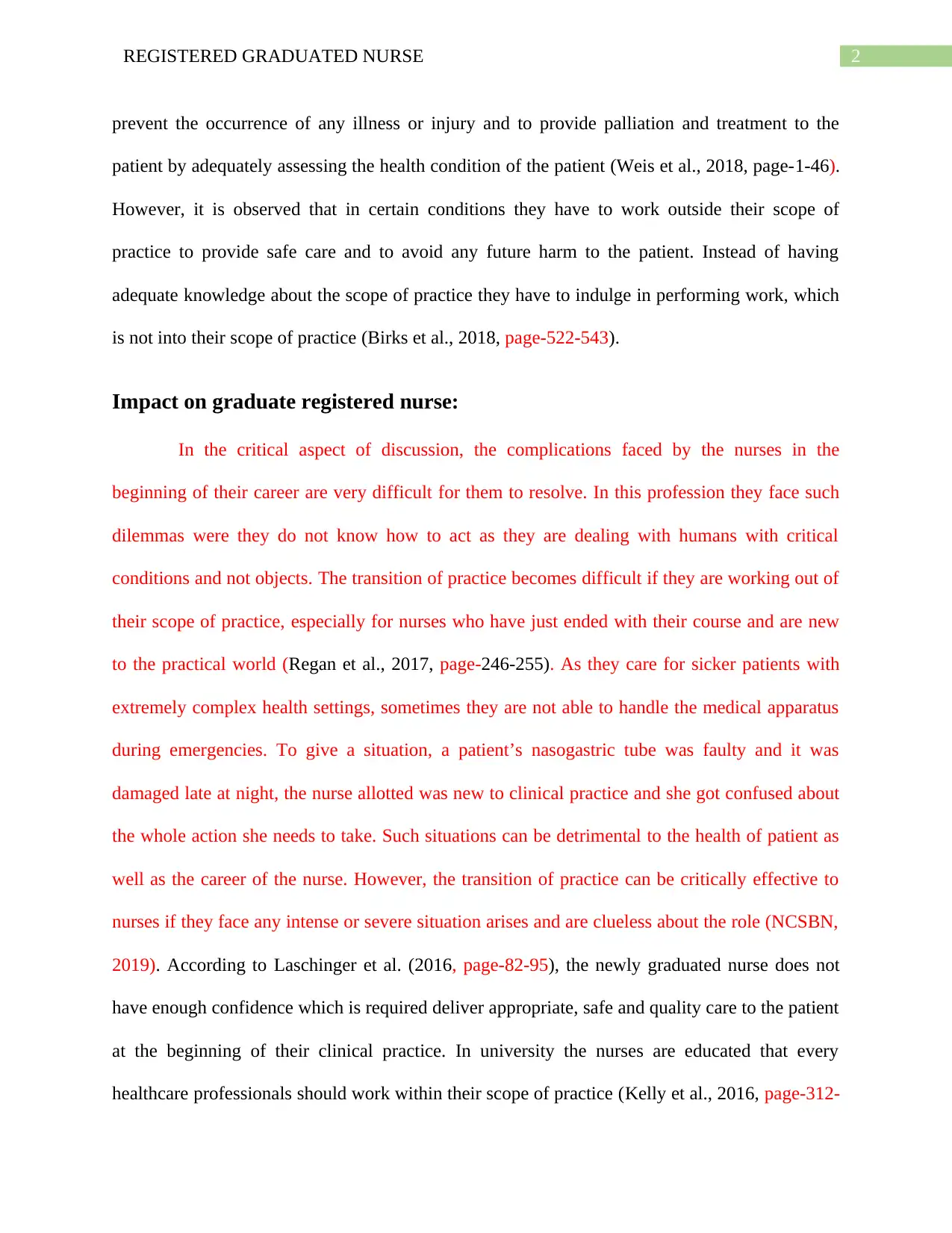
2REGISTERED GRADUATED NURSE
prevent the occurrence of any illness or injury and to provide palliation and treatment to the
patient by adequately assessing the health condition of the patient (Weis et al., 2018, page-1-46).
However, it is observed that in certain conditions they have to work outside their scope of
practice to provide safe care and to avoid any future harm to the patient. Instead of having
adequate knowledge about the scope of practice they have to indulge in performing work, which
is not into their scope of practice (Birks et al., 2018, page-522-543).
Impact on graduate registered nurse:
In the critical aspect of discussion, the complications faced by the nurses in the
beginning of their career are very difficult for them to resolve. In this profession they face such
dilemmas were they do not know how to act as they are dealing with humans with critical
conditions and not objects. The transition of practice becomes difficult if they are working out of
their scope of practice, especially for nurses who have just ended with their course and are new
to the practical world (Regan et al., 2017, page-246-255). As they care for sicker patients with
extremely complex health settings, sometimes they are not able to handle the medical apparatus
during emergencies. To give a situation, a patient’s nasogastric tube was faulty and it was
damaged late at night, the nurse allotted was new to clinical practice and she got confused about
the whole action she needs to take. Such situations can be detrimental to the health of patient as
well as the career of the nurse. However, the transition of practice can be critically effective to
nurses if they face any intense or severe situation arises and are clueless about the role (NCSBN,
2019). According to Laschinger et al. (2016, page-82-95), the newly graduated nurse does not
have enough confidence which is required deliver appropriate, safe and quality care to the patient
at the beginning of their clinical practice. In university the nurses are educated that every
healthcare professionals should work within their scope of practice (Kelly et al., 2016, page-312-
prevent the occurrence of any illness or injury and to provide palliation and treatment to the
patient by adequately assessing the health condition of the patient (Weis et al., 2018, page-1-46).
However, it is observed that in certain conditions they have to work outside their scope of
practice to provide safe care and to avoid any future harm to the patient. Instead of having
adequate knowledge about the scope of practice they have to indulge in performing work, which
is not into their scope of practice (Birks et al., 2018, page-522-543).
Impact on graduate registered nurse:
In the critical aspect of discussion, the complications faced by the nurses in the
beginning of their career are very difficult for them to resolve. In this profession they face such
dilemmas were they do not know how to act as they are dealing with humans with critical
conditions and not objects. The transition of practice becomes difficult if they are working out of
their scope of practice, especially for nurses who have just ended with their course and are new
to the practical world (Regan et al., 2017, page-246-255). As they care for sicker patients with
extremely complex health settings, sometimes they are not able to handle the medical apparatus
during emergencies. To give a situation, a patient’s nasogastric tube was faulty and it was
damaged late at night, the nurse allotted was new to clinical practice and she got confused about
the whole action she needs to take. Such situations can be detrimental to the health of patient as
well as the career of the nurse. However, the transition of practice can be critically effective to
nurses if they face any intense or severe situation arises and are clueless about the role (NCSBN,
2019). According to Laschinger et al. (2016, page-82-95), the newly graduated nurse does not
have enough confidence which is required deliver appropriate, safe and quality care to the patient
at the beginning of their clinical practice. In university the nurses are educated that every
healthcare professionals should work within their scope of practice (Kelly et al., 2016, page-312-
⊘ This is a preview!⊘
Do you want full access?
Subscribe today to unlock all pages.

Trusted by 1+ million students worldwide
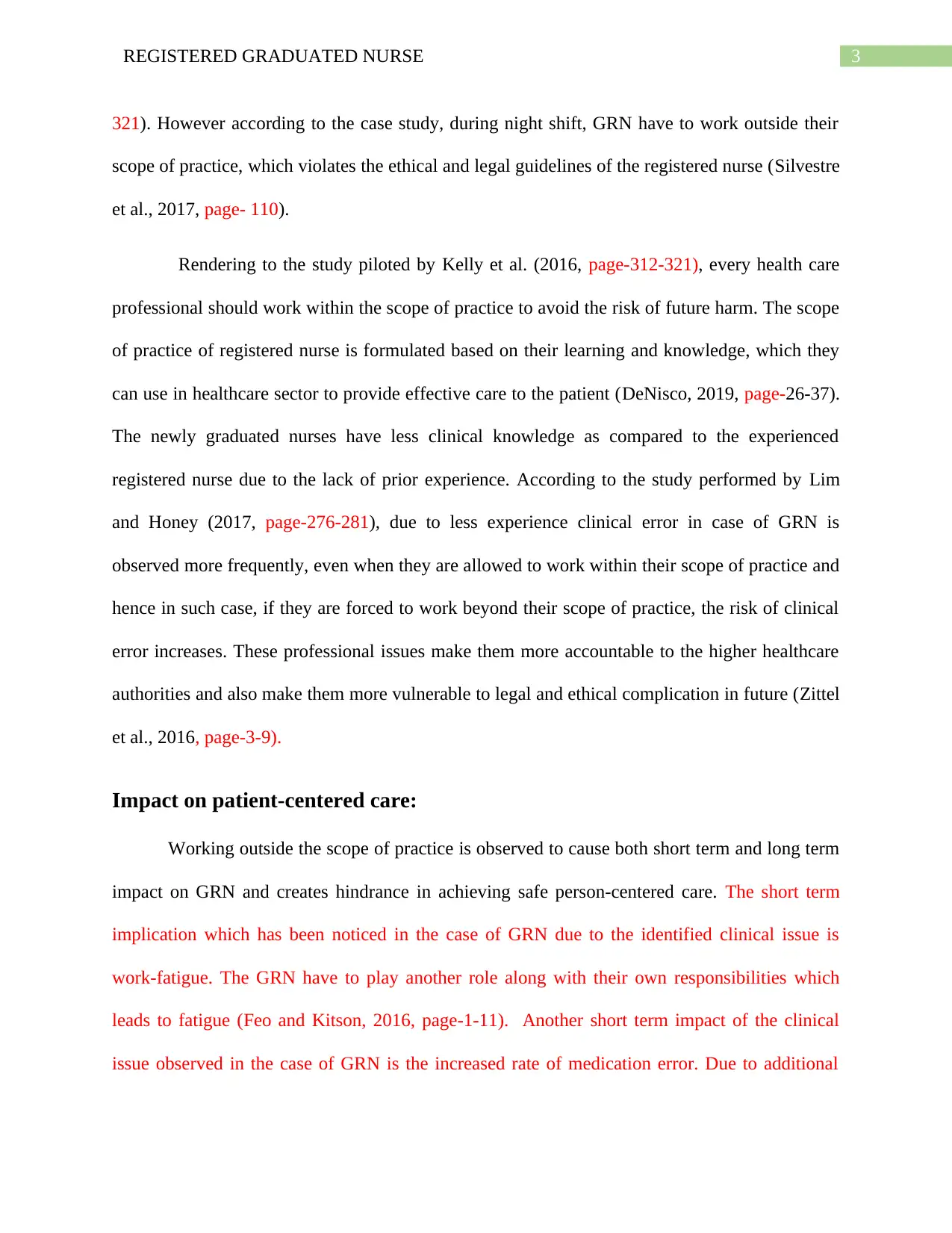
3REGISTERED GRADUATED NURSE
321). However according to the case study, during night shift, GRN have to work outside their
scope of practice, which violates the ethical and legal guidelines of the registered nurse (Silvestre
et al., 2017, page- 110).
Rendering to the study piloted by Kelly et al. (2016, page-312-321), every health care
professional should work within the scope of practice to avoid the risk of future harm. The scope
of practice of registered nurse is formulated based on their learning and knowledge, which they
can use in healthcare sector to provide effective care to the patient (DeNisco, 2019, page-26-37).
The newly graduated nurses have less clinical knowledge as compared to the experienced
registered nurse due to the lack of prior experience. According to the study performed by Lim
and Honey (2017, page-276-281), due to less experience clinical error in case of GRN is
observed more frequently, even when they are allowed to work within their scope of practice and
hence in such case, if they are forced to work beyond their scope of practice, the risk of clinical
error increases. These professional issues make them more accountable to the higher healthcare
authorities and also make them more vulnerable to legal and ethical complication in future (Zittel
et al., 2016, page-3-9).
Impact on patient-centered care:
Working outside the scope of practice is observed to cause both short term and long term
impact on GRN and creates hindrance in achieving safe person-centered care. The short term
implication which has been noticed in the case of GRN due to the identified clinical issue is
work-fatigue. The GRN have to play another role along with their own responsibilities which
leads to fatigue (Feo and Kitson, 2016, page-1-11). Another short term impact of the clinical
issue observed in the case of GRN is the increased rate of medication error. Due to additional
321). However according to the case study, during night shift, GRN have to work outside their
scope of practice, which violates the ethical and legal guidelines of the registered nurse (Silvestre
et al., 2017, page- 110).
Rendering to the study piloted by Kelly et al. (2016, page-312-321), every health care
professional should work within the scope of practice to avoid the risk of future harm. The scope
of practice of registered nurse is formulated based on their learning and knowledge, which they
can use in healthcare sector to provide effective care to the patient (DeNisco, 2019, page-26-37).
The newly graduated nurses have less clinical knowledge as compared to the experienced
registered nurse due to the lack of prior experience. According to the study performed by Lim
and Honey (2017, page-276-281), due to less experience clinical error in case of GRN is
observed more frequently, even when they are allowed to work within their scope of practice and
hence in such case, if they are forced to work beyond their scope of practice, the risk of clinical
error increases. These professional issues make them more accountable to the higher healthcare
authorities and also make them more vulnerable to legal and ethical complication in future (Zittel
et al., 2016, page-3-9).
Impact on patient-centered care:
Working outside the scope of practice is observed to cause both short term and long term
impact on GRN and creates hindrance in achieving safe person-centered care. The short term
implication which has been noticed in the case of GRN due to the identified clinical issue is
work-fatigue. The GRN have to play another role along with their own responsibilities which
leads to fatigue (Feo and Kitson, 2016, page-1-11). Another short term impact of the clinical
issue observed in the case of GRN is the increased rate of medication error. Due to additional
Paraphrase This Document
Need a fresh take? Get an instant paraphrase of this document with our AI Paraphraser
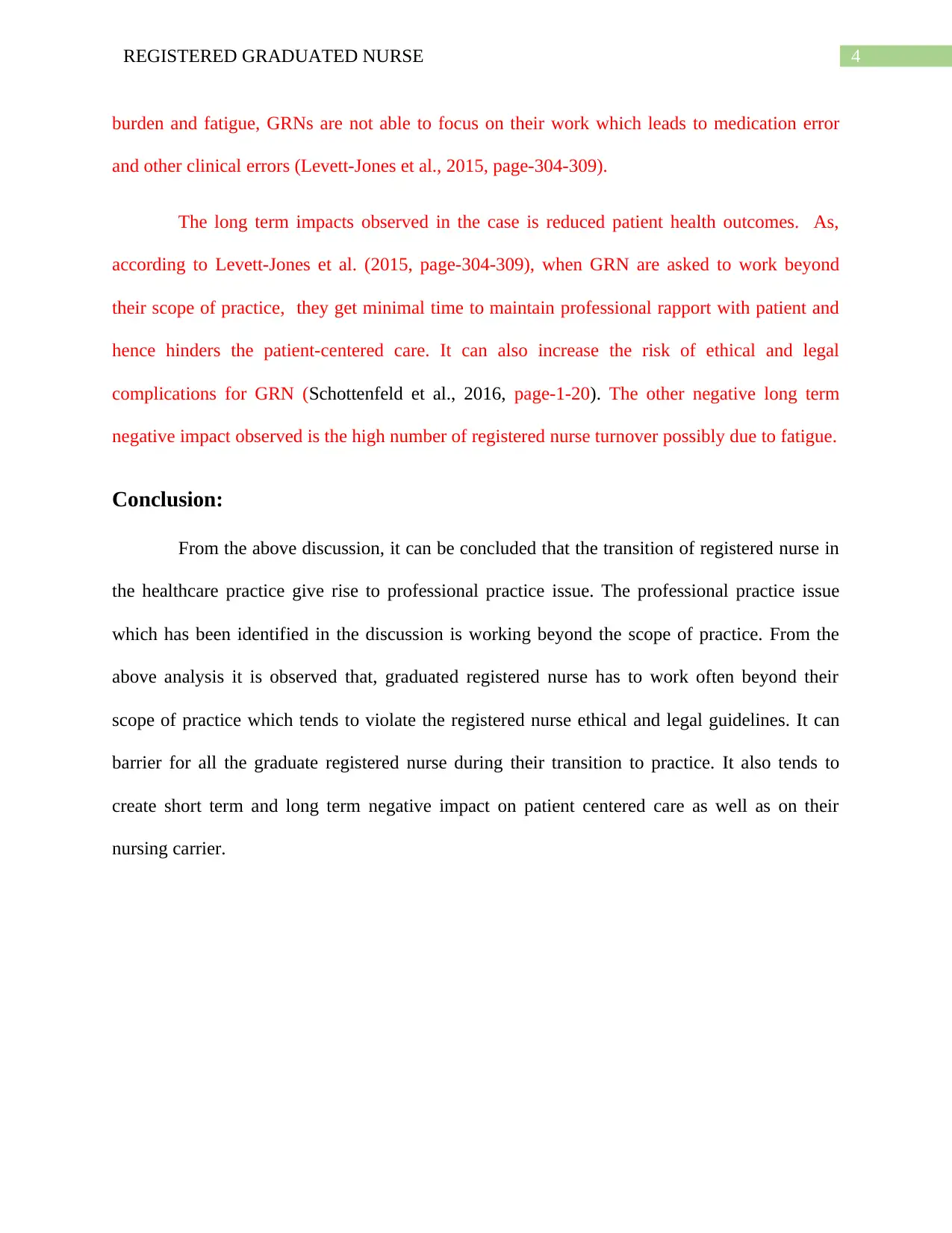
4REGISTERED GRADUATED NURSE
burden and fatigue, GRNs are not able to focus on their work which leads to medication error
and other clinical errors (Levett-Jones et al., 2015, page-304-309).
The long term impacts observed in the case is reduced patient health outcomes. As,
according to Levett-Jones et al. (2015, page-304-309), when GRN are asked to work beyond
their scope of practice, they get minimal time to maintain professional rapport with patient and
hence hinders the patient-centered care. It can also increase the risk of ethical and legal
complications for GRN (Schottenfeld et al., 2016, page-1-20). The other negative long term
negative impact observed is the high number of registered nurse turnover possibly due to fatigue.
Conclusion:
From the above discussion, it can be concluded that the transition of registered nurse in
the healthcare practice give rise to professional practice issue. The professional practice issue
which has been identified in the discussion is working beyond the scope of practice. From the
above analysis it is observed that, graduated registered nurse has to work often beyond their
scope of practice which tends to violate the registered nurse ethical and legal guidelines. It can
barrier for all the graduate registered nurse during their transition to practice. It also tends to
create short term and long term negative impact on patient centered care as well as on their
nursing carrier.
burden and fatigue, GRNs are not able to focus on their work which leads to medication error
and other clinical errors (Levett-Jones et al., 2015, page-304-309).
The long term impacts observed in the case is reduced patient health outcomes. As,
according to Levett-Jones et al. (2015, page-304-309), when GRN are asked to work beyond
their scope of practice, they get minimal time to maintain professional rapport with patient and
hence hinders the patient-centered care. It can also increase the risk of ethical and legal
complications for GRN (Schottenfeld et al., 2016, page-1-20). The other negative long term
negative impact observed is the high number of registered nurse turnover possibly due to fatigue.
Conclusion:
From the above discussion, it can be concluded that the transition of registered nurse in
the healthcare practice give rise to professional practice issue. The professional practice issue
which has been identified in the discussion is working beyond the scope of practice. From the
above analysis it is observed that, graduated registered nurse has to work often beyond their
scope of practice which tends to violate the registered nurse ethical and legal guidelines. It can
barrier for all the graduate registered nurse during their transition to practice. It also tends to
create short term and long term negative impact on patient centered care as well as on their
nursing carrier.
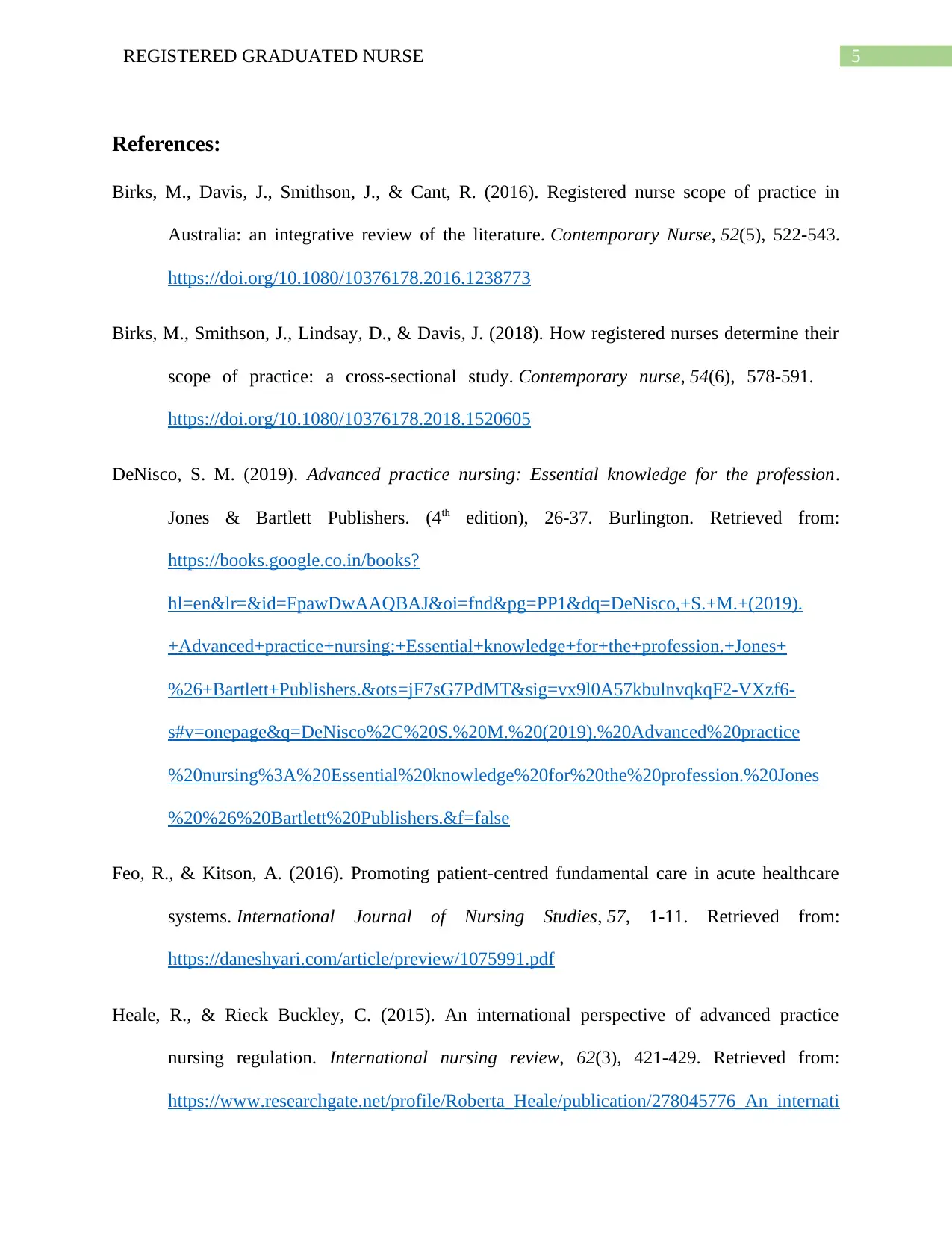
5REGISTERED GRADUATED NURSE
References:
Birks, M., Davis, J., Smithson, J., & Cant, R. (2016). Registered nurse scope of practice in
Australia: an integrative review of the literature. Contemporary Nurse, 52(5), 522-543.
https://doi.org/10.1080/10376178.2016.1238773
Birks, M., Smithson, J., Lindsay, D., & Davis, J. (2018). How registered nurses determine their
scope of practice: a cross-sectional study. Contemporary nurse, 54(6), 578-591.
https://doi.org/10.1080/10376178.2018.1520605
DeNisco, S. M. (2019). Advanced practice nursing: Essential knowledge for the profession.
Jones & Bartlett Publishers. (4th edition), 26-37. Burlington. Retrieved from:
https://books.google.co.in/books?
hl=en&lr=&id=FpawDwAAQBAJ&oi=fnd&pg=PP1&dq=DeNisco,+S.+M.+(2019).
+Advanced+practice+nursing:+Essential+knowledge+for+the+profession.+Jones+
%26+Bartlett+Publishers.&ots=jF7sG7PdMT&sig=vx9l0A57kbulnvqkqF2-VXzf6-
s#v=onepage&q=DeNisco%2C%20S.%20M.%20(2019).%20Advanced%20practice
%20nursing%3A%20Essential%20knowledge%20for%20the%20profession.%20Jones
%20%26%20Bartlett%20Publishers.&f=false
Feo, R., & Kitson, A. (2016). Promoting patient-centred fundamental care in acute healthcare
systems. International Journal of Nursing Studies, 57, 1-11. Retrieved from:
https://daneshyari.com/article/preview/1075991.pdf
Heale, R., & Rieck Buckley, C. (2015). An international perspective of advanced practice
nursing regulation. International nursing review, 62(3), 421-429. Retrieved from:
https://www.researchgate.net/profile/Roberta_Heale/publication/278045776_An_internati
References:
Birks, M., Davis, J., Smithson, J., & Cant, R. (2016). Registered nurse scope of practice in
Australia: an integrative review of the literature. Contemporary Nurse, 52(5), 522-543.
https://doi.org/10.1080/10376178.2016.1238773
Birks, M., Smithson, J., Lindsay, D., & Davis, J. (2018). How registered nurses determine their
scope of practice: a cross-sectional study. Contemporary nurse, 54(6), 578-591.
https://doi.org/10.1080/10376178.2018.1520605
DeNisco, S. M. (2019). Advanced practice nursing: Essential knowledge for the profession.
Jones & Bartlett Publishers. (4th edition), 26-37. Burlington. Retrieved from:
https://books.google.co.in/books?
hl=en&lr=&id=FpawDwAAQBAJ&oi=fnd&pg=PP1&dq=DeNisco,+S.+M.+(2019).
+Advanced+practice+nursing:+Essential+knowledge+for+the+profession.+Jones+
%26+Bartlett+Publishers.&ots=jF7sG7PdMT&sig=vx9l0A57kbulnvqkqF2-VXzf6-
s#v=onepage&q=DeNisco%2C%20S.%20M.%20(2019).%20Advanced%20practice
%20nursing%3A%20Essential%20knowledge%20for%20the%20profession.%20Jones
%20%26%20Bartlett%20Publishers.&f=false
Feo, R., & Kitson, A. (2016). Promoting patient-centred fundamental care in acute healthcare
systems. International Journal of Nursing Studies, 57, 1-11. Retrieved from:
https://daneshyari.com/article/preview/1075991.pdf
Heale, R., & Rieck Buckley, C. (2015). An international perspective of advanced practice
nursing regulation. International nursing review, 62(3), 421-429. Retrieved from:
https://www.researchgate.net/profile/Roberta_Heale/publication/278045776_An_internati
⊘ This is a preview!⊘
Do you want full access?
Subscribe today to unlock all pages.

Trusted by 1+ million students worldwide
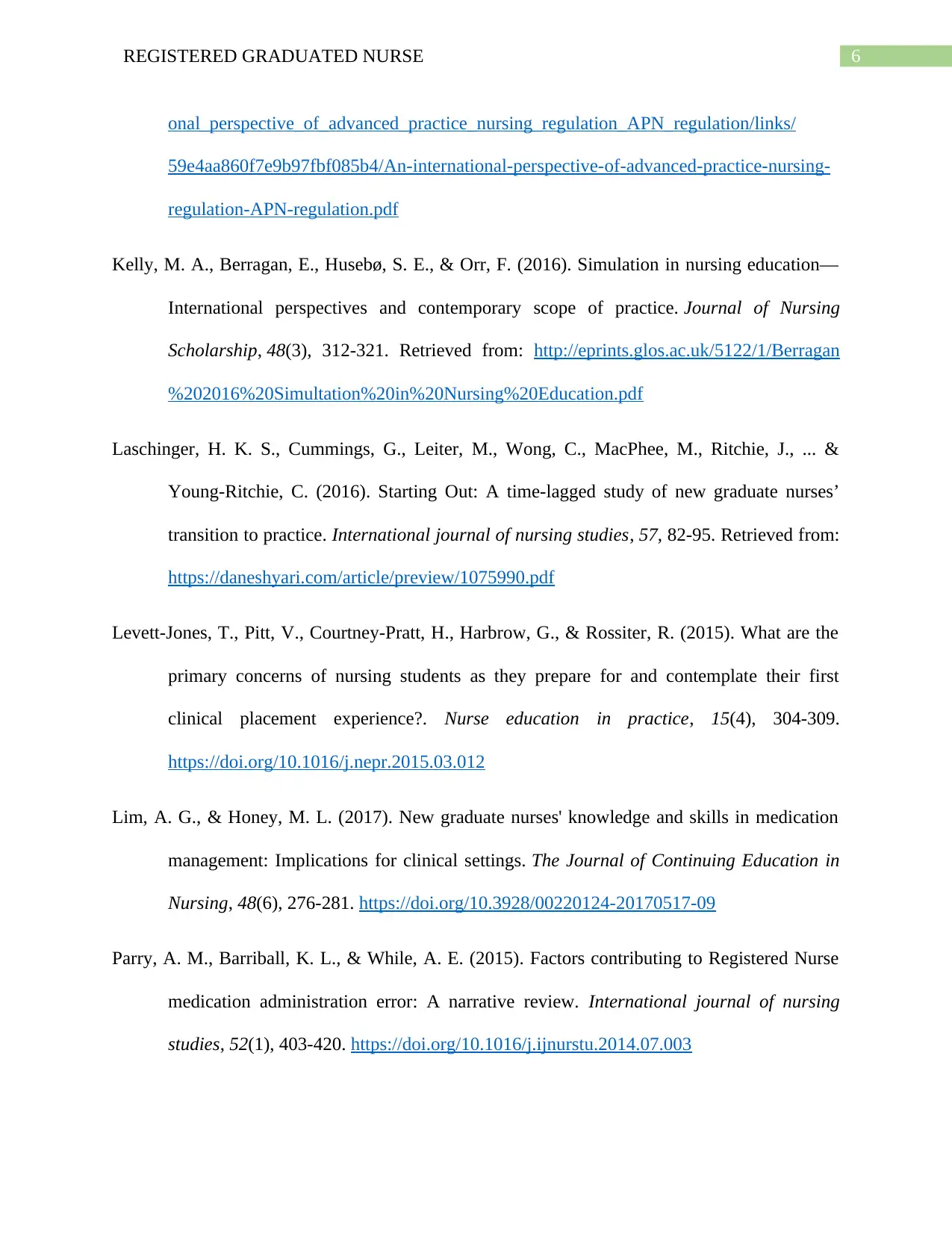
6REGISTERED GRADUATED NURSE
onal_perspective_of_advanced_practice_nursing_regulation_APN_regulation/links/
59e4aa860f7e9b97fbf085b4/An-international-perspective-of-advanced-practice-nursing-
regulation-APN-regulation.pdf
Kelly, M. A., Berragan, E., Husebø, S. E., & Orr, F. (2016). Simulation in nursing education—
International perspectives and contemporary scope of practice. Journal of Nursing
Scholarship, 48(3), 312-321. Retrieved from: http://eprints.glos.ac.uk/5122/1/Berragan
%202016%20Simultation%20in%20Nursing%20Education.pdf
Laschinger, H. K. S., Cummings, G., Leiter, M., Wong, C., MacPhee, M., Ritchie, J., ... &
Young-Ritchie, C. (2016). Starting Out: A time-lagged study of new graduate nurses’
transition to practice. International journal of nursing studies, 57, 82-95. Retrieved from:
https://daneshyari.com/article/preview/1075990.pdf
Levett-Jones, T., Pitt, V., Courtney-Pratt, H., Harbrow, G., & Rossiter, R. (2015). What are the
primary concerns of nursing students as they prepare for and contemplate their first
clinical placement experience?. Nurse education in practice, 15(4), 304-309.
https://doi.org/10.1016/j.nepr.2015.03.012
Lim, A. G., & Honey, M. L. (2017). New graduate nurses' knowledge and skills in medication
management: Implications for clinical settings. The Journal of Continuing Education in
Nursing, 48(6), 276-281. https://doi.org/10.3928/00220124-20170517-09
Parry, A. M., Barriball, K. L., & While, A. E. (2015). Factors contributing to Registered Nurse
medication administration error: A narrative review. International journal of nursing
studies, 52(1), 403-420. https://doi.org/10.1016/j.ijnurstu.2014.07.003
onal_perspective_of_advanced_practice_nursing_regulation_APN_regulation/links/
59e4aa860f7e9b97fbf085b4/An-international-perspective-of-advanced-practice-nursing-
regulation-APN-regulation.pdf
Kelly, M. A., Berragan, E., Husebø, S. E., & Orr, F. (2016). Simulation in nursing education—
International perspectives and contemporary scope of practice. Journal of Nursing
Scholarship, 48(3), 312-321. Retrieved from: http://eprints.glos.ac.uk/5122/1/Berragan
%202016%20Simultation%20in%20Nursing%20Education.pdf
Laschinger, H. K. S., Cummings, G., Leiter, M., Wong, C., MacPhee, M., Ritchie, J., ... &
Young-Ritchie, C. (2016). Starting Out: A time-lagged study of new graduate nurses’
transition to practice. International journal of nursing studies, 57, 82-95. Retrieved from:
https://daneshyari.com/article/preview/1075990.pdf
Levett-Jones, T., Pitt, V., Courtney-Pratt, H., Harbrow, G., & Rossiter, R. (2015). What are the
primary concerns of nursing students as they prepare for and contemplate their first
clinical placement experience?. Nurse education in practice, 15(4), 304-309.
https://doi.org/10.1016/j.nepr.2015.03.012
Lim, A. G., & Honey, M. L. (2017). New graduate nurses' knowledge and skills in medication
management: Implications for clinical settings. The Journal of Continuing Education in
Nursing, 48(6), 276-281. https://doi.org/10.3928/00220124-20170517-09
Parry, A. M., Barriball, K. L., & While, A. E. (2015). Factors contributing to Registered Nurse
medication administration error: A narrative review. International journal of nursing
studies, 52(1), 403-420. https://doi.org/10.1016/j.ijnurstu.2014.07.003
Paraphrase This Document
Need a fresh take? Get an instant paraphrase of this document with our AI Paraphraser
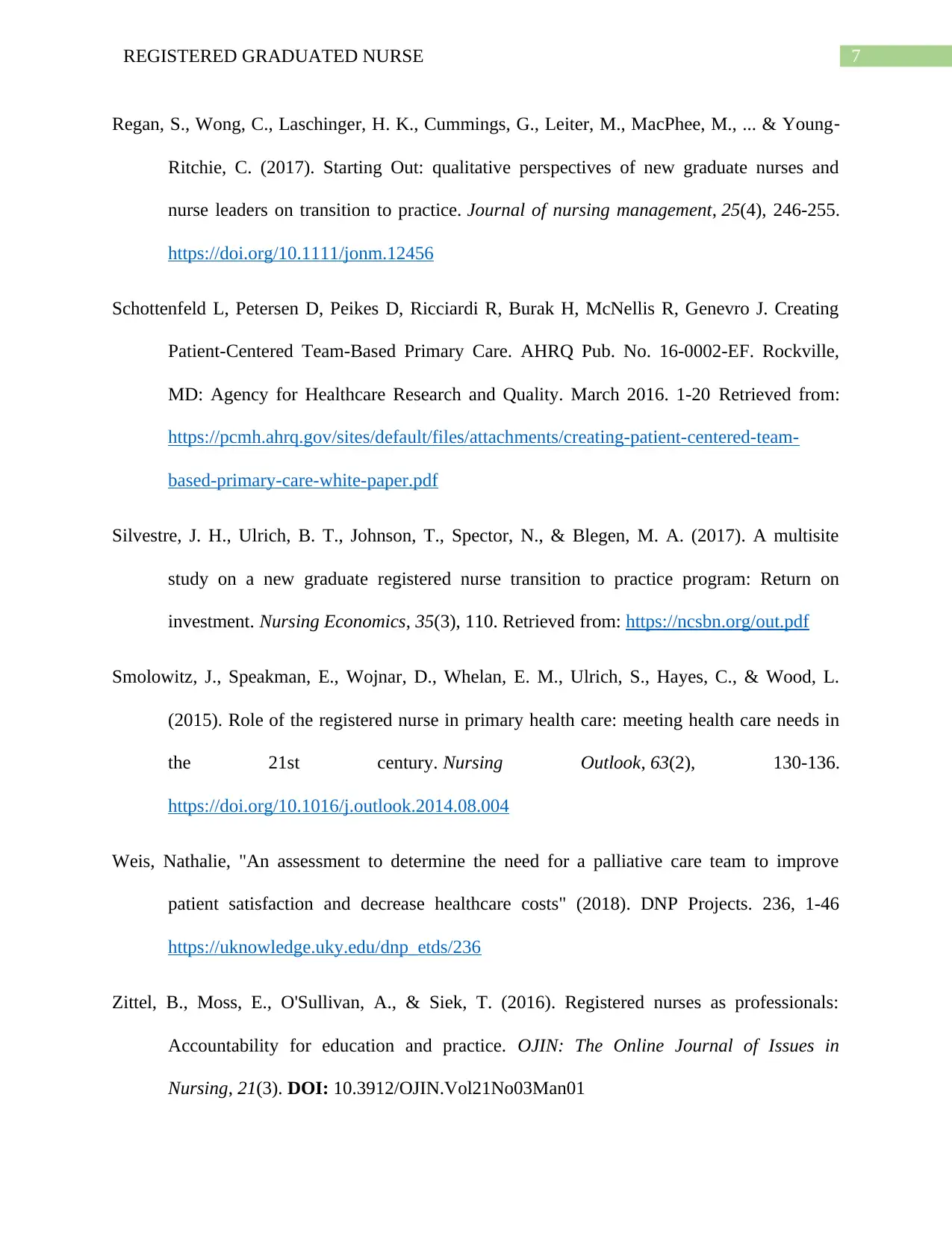
7REGISTERED GRADUATED NURSE
Regan, S., Wong, C., Laschinger, H. K., Cummings, G., Leiter, M., MacPhee, M., ... & Young‐
Ritchie, C. (2017). Starting Out: qualitative perspectives of new graduate nurses and
nurse leaders on transition to practice. Journal of nursing management, 25(4), 246-255.
https://doi.org/10.1111/jonm.12456
Schottenfeld L, Petersen D, Peikes D, Ricciardi R, Burak H, McNellis R, Genevro J. Creating
Patient-Centered Team-Based Primary Care. AHRQ Pub. No. 16-0002-EF. Rockville,
MD: Agency for Healthcare Research and Quality. March 2016. 1-20 Retrieved from:
https://pcmh.ahrq.gov/sites/default/files/attachments/creating-patient-centered-team-
based-primary-care-white-paper.pdf
Silvestre, J. H., Ulrich, B. T., Johnson, T., Spector, N., & Blegen, M. A. (2017). A multisite
study on a new graduate registered nurse transition to practice program: Return on
investment. Nursing Economics, 35(3), 110. Retrieved from: https://ncsbn.org/out.pdf
Smolowitz, J., Speakman, E., Wojnar, D., Whelan, E. M., Ulrich, S., Hayes, C., & Wood, L.
(2015). Role of the registered nurse in primary health care: meeting health care needs in
the 21st century. Nursing Outlook, 63(2), 130-136.
https://doi.org/10.1016/j.outlook.2014.08.004
Weis, Nathalie, "An assessment to determine the need for a palliative care team to improve
patient satisfaction and decrease healthcare costs" (2018). DNP Projects. 236, 1-46
https://uknowledge.uky.edu/dnp_etds/236
Zittel, B., Moss, E., O'Sullivan, A., & Siek, T. (2016). Registered nurses as professionals:
Accountability for education and practice. OJIN: The Online Journal of Issues in
Nursing, 21(3). DOI: 10.3912/OJIN.Vol21No03Man01
Regan, S., Wong, C., Laschinger, H. K., Cummings, G., Leiter, M., MacPhee, M., ... & Young‐
Ritchie, C. (2017). Starting Out: qualitative perspectives of new graduate nurses and
nurse leaders on transition to practice. Journal of nursing management, 25(4), 246-255.
https://doi.org/10.1111/jonm.12456
Schottenfeld L, Petersen D, Peikes D, Ricciardi R, Burak H, McNellis R, Genevro J. Creating
Patient-Centered Team-Based Primary Care. AHRQ Pub. No. 16-0002-EF. Rockville,
MD: Agency for Healthcare Research and Quality. March 2016. 1-20 Retrieved from:
https://pcmh.ahrq.gov/sites/default/files/attachments/creating-patient-centered-team-
based-primary-care-white-paper.pdf
Silvestre, J. H., Ulrich, B. T., Johnson, T., Spector, N., & Blegen, M. A. (2017). A multisite
study on a new graduate registered nurse transition to practice program: Return on
investment. Nursing Economics, 35(3), 110. Retrieved from: https://ncsbn.org/out.pdf
Smolowitz, J., Speakman, E., Wojnar, D., Whelan, E. M., Ulrich, S., Hayes, C., & Wood, L.
(2015). Role of the registered nurse in primary health care: meeting health care needs in
the 21st century. Nursing Outlook, 63(2), 130-136.
https://doi.org/10.1016/j.outlook.2014.08.004
Weis, Nathalie, "An assessment to determine the need for a palliative care team to improve
patient satisfaction and decrease healthcare costs" (2018). DNP Projects. 236, 1-46
https://uknowledge.uky.edu/dnp_etds/236
Zittel, B., Moss, E., O'Sullivan, A., & Siek, T. (2016). Registered nurses as professionals:
Accountability for education and practice. OJIN: The Online Journal of Issues in
Nursing, 21(3). DOI: 10.3912/OJIN.Vol21No03Man01

8REGISTERED GRADUATED NURSE
⊘ This is a preview!⊘
Do you want full access?
Subscribe today to unlock all pages.

Trusted by 1+ million students worldwide
1 out of 9
Related Documents
Your All-in-One AI-Powered Toolkit for Academic Success.
+13062052269
info@desklib.com
Available 24*7 on WhatsApp / Email
![[object Object]](/_next/static/media/star-bottom.7253800d.svg)
Unlock your academic potential
Copyright © 2020–2025 A2Z Services. All Rights Reserved. Developed and managed by ZUCOL.





